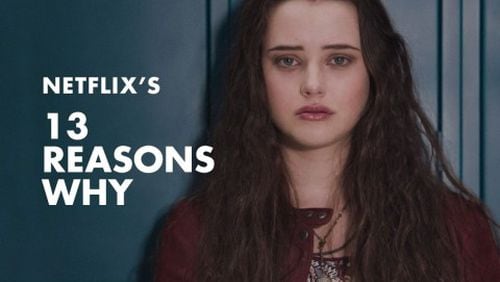Note Friday night: The commenting tool on this blog was broken for 24 hours, and only comments flowing from Facebook were appearing. It is now fixed. Maureen
Worries over the impact of the Netflix series "13 Reasons Why" on adolescent viewers are escalating. Marietta City Schools sent home a letter advising parents its counselors and staff are seeing a rise in "severe emotional distress, hyper vigilance, and, in some isolated cases, suicide ideation," with some students citing the Netflix drama about teen suicide that began airing March 31.
A troubling element to counselors is that kids can binge-watch all the episodes alone in their rooms on computers, saturating themselves for hours or days in the emotionally draining drama about a likable and talented high school junior who kills herself and leaves behind 13 recordings detailing the reasons and people influential in her decision.
Suicide is the second leading cause of death for those between the ages of 10 and 24. That is also an age group susceptible to what is known as suicide contagions or copycat suicides. A "suicide contagion" occurs when people are influenced to suicidal thoughts through exposure to suicidal behavior, sometimes through detailed media reports about a local suicide. Adolescents and young adults are at particular risk of thinking. "I have the same problems as that person. This could be my way out, too."
A report by the Centers for Disease Control and Prevention states: One risk factor that has emerged from this research is suicide "contagion," a process by which exposure to the suicide or suicidal behavior of one or more persons influences others to commit or attempt suicide. Evidence suggests that the effect of contagion is not confined to suicides occurring in discrete geographic areas...The effect of contagion appears to be strongest among adolescents, and several well publicized "clusters" among young persons have occurred.
Some districts including City Schools of Decatur are sharing a response to the series with parents assembled by Georgia HOPE, a local provider of mental health and substance abuse counseling services. Here it is:
However, the series (which many teens are binge watching without adult supervision and support) is concerning to many of us in the behavioral health field, in that it has the potential to sensationalize the tragic issue of youth suicide.
The show's powerful storytelling may lead impressionable viewers to romanticize the choices made by the characters and/or develop revenge fantasies. Also concerning, are the adult characters in the show (including a school counselor) who inadequately addresses the main character's pleas for help and do not encourage a sense of trust or ability to help.
While we know many youth are resilient and capable of differentiating between TV drama and reality, engaging in thoughtful conversations with youth about the show is vital. Doing so presents an opportunity to help process issues addressed, contemplate consequences, and reinforce the message that suicide is a permanent solution to a temporary problem.
Research shows that exposure to suicide, or to graphic or sensationalized accounts of death, can be one of the many risk factors that contribute to a suicide attempt.
In an effort to provide some counter messages of hope, we'd like to provide you with...
13 REASONS WHY NOT
Suicide is final. Once you take your life, there's no going back.
You have already survived so much.
Suicide eliminates the possibility of it every getting better.
No feeling is final. - Rainer Maria Rilke
Your dreams have some fulfilling to do.
Reaching out shows strength.
Good people exist.
Your courage to live can inspire others. Others need to hear your story of survival.
There are many important words you haven't yet said.
No one can ever replace you. We need you here.
You are not alone in your struggle.
Your family, friends, and loved ones would suffer deeply from the loss of you.
Hope is here. Trained professionals are here to listen to you and help you move past this feeling. Treatment is available and can help. If you or someone you know are contemplating suicide call 1-800-273-TALK (8255) or text "GA" to 741741
Netflix has responded with increased warnings on the shows and referrals to mental health hotlines. However, Common Sense Media CEO Jim Steyer tells Netflix CEO Reed Hastings in this letter that more ought to be done:
I am writing you directly about Netflix's recent release, "13 Reasons Why," since I've known and respected you for a long time and I know you care a lot about kids and education issues.
Common Sense Media has been hearing a great deal from many concerned parents and educators about the show due to its mature and graphic content, serious subject matter, and its accessibility by young viewers.
There is much debate around the country about the impact of this show on kids and teens, but that is not the purpose of this letter.
As you know from our long relationship, Common Sense Media believes in sanity, not censorship. We believe it's up to parents to decide whether or not shows like "13 Reasons Why" are age-appropriate for their kids. We recognize that every child is different, and that parents can make up their own mind about whether their child or teenager is ready for programming that covers sensitive topics.
That said, parents can't make informed decisions if they don't know there is a decision to make in the first place and if they don't have the information they need to help them make the decision.
To be frank, we are genuinely disappointed and concerned with Netflix's lack of policy for informing parents about the kinds of shows available on its platform. It is highly irresponsible, and Netflix's response this week to simply add warnings to the program does not adequately address the bigger problem.
I'm writing to you personally to ask you to take a more meaningful and active social responsibility stance for your platform. Put simply, Common Sense is calling on Netflix to vastly upgrade its policy and practices when it comes to MA shows targeted at young audiences launching on the platform. In short, we firmly believe that Netflix needs to provide far more and better guidance for families to make informed decisions.
In response to "13 Reasons Why," we recommend Netflix:
•Immediately email any account that has viewed one or more of the episodes and include suicide prevention resources and discussion guides for families.
•Use the Netflix algorithm to make sure that 13 Reasons Why isn't being promoted to any accounts viewing content that skews younger than 16.
•Immediately place suicide prevention resources in and adjacent to the show on the Netflix platform.
In addition, for future releases, we strongly recommend that Netflix should:
•Refine and promote your parent control parameters and make them more accessible in advance of releases.
We know from various media reports that Netflix was well aware that this show was going to be controversial, since your team reached out to numerous suicide prevention organizations and mental health experts asking for their support.
You were willing to build your case in advance for the series, yet it does not seem like the company was similarly willing to warn parents in advance that this might not be appropriate viewing for their kids, particularly ones.
By changing your policy to a more informative and transparent one, we think you would actually build credibility and trust with your customers. Netflix customers are well aware that you know how to reach them when it comes to payments, promotions, and surveys. How about reaching out to them with a courtesy email to make sure they are aware of potentially inappropriate content for their kids?
The tech industry takes a lot of heat for making decisions based on revenues and market share and dealing with the consequences later. In this case, Netflix wouldn't even be risking revenues. You would not be telling people to cancel their subscription or stop watching shows — you would simply be doing your family customers an important service by providing them with information to help them make informed decisions.
Netflix has an opportunity to establish itself not only as a leader in creative programming, but also as an industry leader in encouraging responsible viewing and viewing habits of their audiences -- especially kids and teens.
About the Author







